
Load from PC
MC-Ordinal Numbers
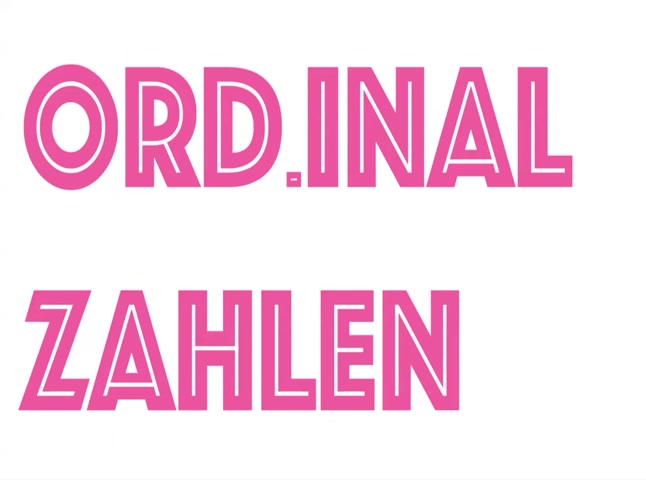
So the German number is made easy .
And let's start this whole thing with uh something uh light and uh a little test .
And the question is what is every German's favorite number ?
It's of course , nine , let's look at the ordinal numbers and the ordinal numbers contain the word or which is of course , order and these are used to order things .
You know , this I , I focus on the basics .
So in spite of I here are the cardinal numbers as you remember .
But the moment we add a tiny little element to it , the dot the change and again , this is first , the logical approach .
So if it was logical , it would be Einstein's .
But as in English , of course , we have to modify them .
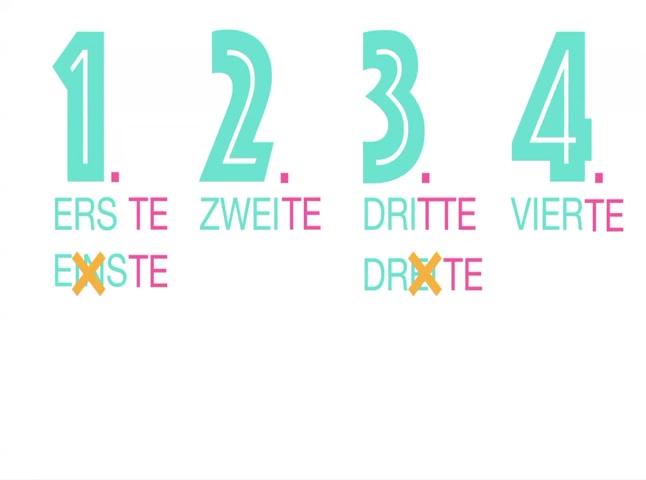
So the first turns into , yeah , it has not much to do with I anymore .
Like in English , it's also not oneness .
It is .
First , I haven't looked that up .
Why ?
That is uh I will do that later for my own pleasure .
But maybe you look it up .
If you're interested is pretty regular in English , you would have second , which in German makes no sense .
But the , the uh we also have in German , which means the second of the time .
Yeah , one minute , two seconds .
So somehow the notion of a second of time is related to the two .
I haven't done any research on that .
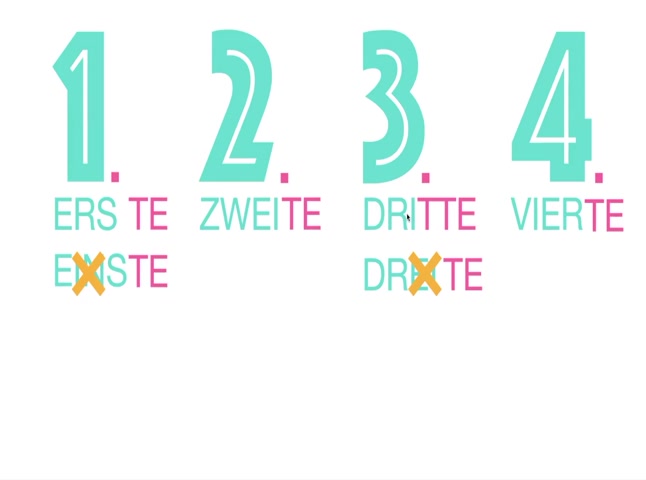
I just realized that it's actually quite interesting if you ask me , you see here also , uh it's a little bit off , it's not brighter , it's , and uh we double the for pronunciation reasons .
So that's the thing we do very often in German , especially in the past tense um with verbs , but this is not the topic here .
Theater is regular and basically anything else after that is also regular .
So this is just to illustrate um similarity between German and English .
So five or the fifth until the 19th is basically regular .
The only exception is number seven .
Yeah , it's not Zinter .
Even though in very old German children's books , you will find Zinter .

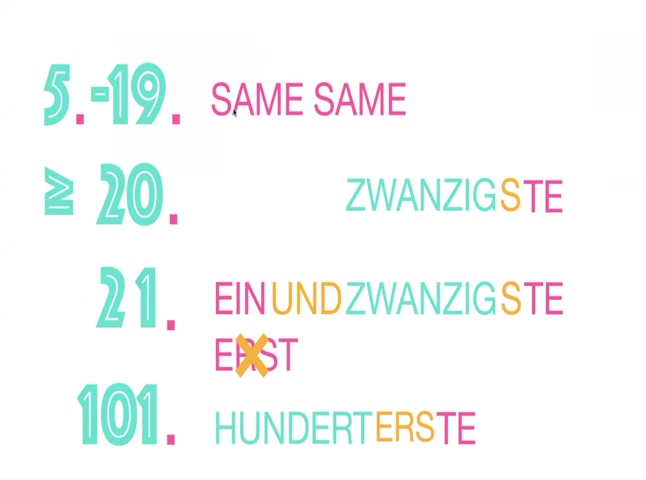
I came across that and I wondered whether that was used in the past and it was , but nowadays you would say zip , but everybody would understand you if you made the mistake or spoke a little bit outdated German , that's fine .
So until between five and 19 , there's not much of a challenge , but from 20th onwards , you have one specialty and the specialty is in orange color here .
And uh that is of course due to pronunciation and uh is is a tricky combination of letters for Germans .
So we have to put an S in there in order to sooth our tongues and throats .
So , and that's for every number until infinity after 20 or from 20 onwards .
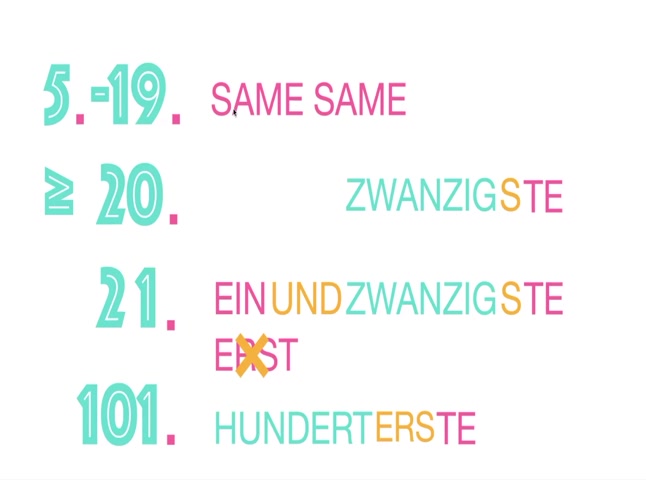
So , Einon sw uh it is also worth noticing because you might maybe think that this could be asked on , excuse my high German .
So , but it's of course uh the 21st , well , well , in English , in German , it's 21 of uh yeah , I just made a beautiful mistake of , of uh using the English word .
So in English , you would say 21st , the Swans , but we say Einon Swans .
But then again , there's 100 and first , back to the beginnings , he asked , he asked the 100 the 100 the 100 so on .
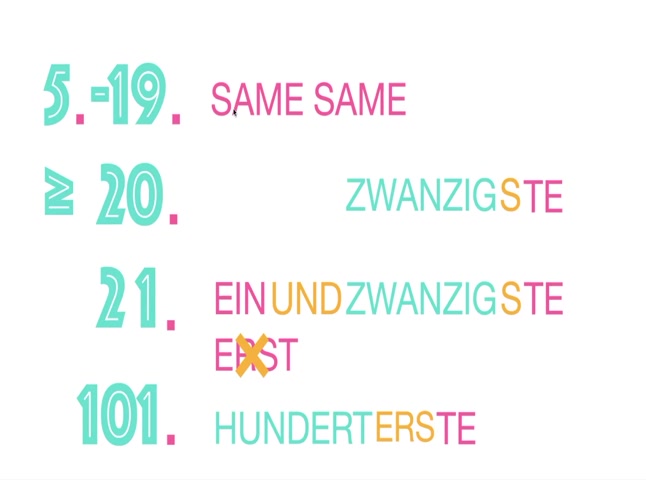
So you see there's a couple of little traps here um which I find just add a little bit of joy to the whole game .
If everything was so logical , it would also be going , you know , but you see , in principle , very logical uh at times certain logics just mingle with each other and uh that might confuse you .
Now , a little grammar for relaxation .
Um you can of course add articles to numbers .
Numbers can uh be used as nouns .
Yeah , the Eins , Ein Eins , uh the numbers , Eins this 1 to 6 in school mean uh school grade .
So if you get your grade paper at the end of the year has a couple of school grades on there .
Um on notes we say in German noon .

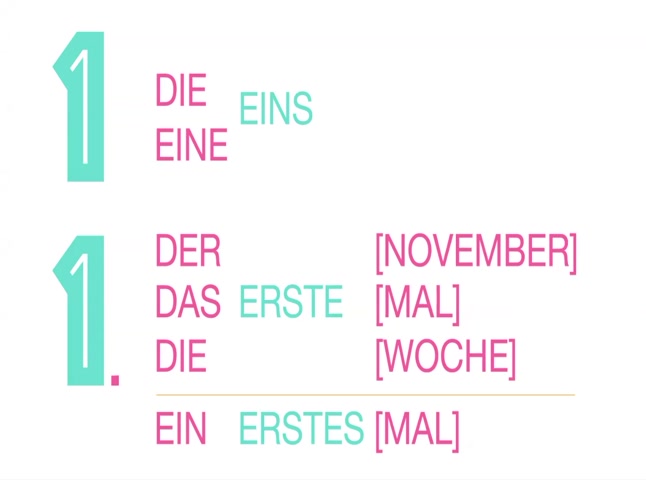
And uh our ideal grade would be the Eins because you are number one , the top position and the six is the worst .
You know , that means you're a complete failure .
And uh let's not talk about the school system , but this is simply what we use if your daughter or your son comes .
Hey , Papa , no , they possibly want to be praised for it .
Uh If they say they probably just need a hug .
So um pay attention to that in Poland .
They turned that around for whatever reason .
Yeah .
Um If you're , you , you want to be under , you want to be the first , not the sixth .
So the original numbers can of course also be used with articles on their own or with a noun .
Um That has only the only consequence of that uh will be whether you capitalize it or not , which is not relevant at this point .
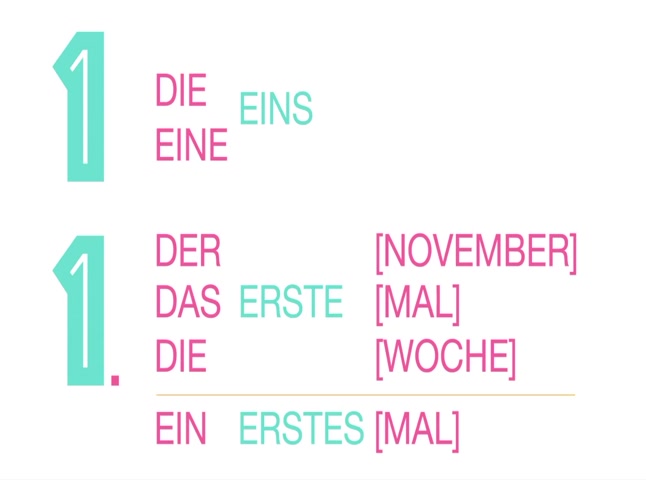
So could be the first of the month .
Could be the first person in a race .
Michel .
He was the first like in English , not much , but it can have any gender .
Yeah , depending on what it relates to .
If it relates to a masculine noun or thing , then it needs to be there to from could also be improved , Ds 10 , the first ones , Ds 10 men , the first human beings , all possible .
And despite being illogical , you could even use it with a , a first , a second , a third .
Um Yeah , I asked the smile and the smile .
There's always a first time .
So it's basically like in English .
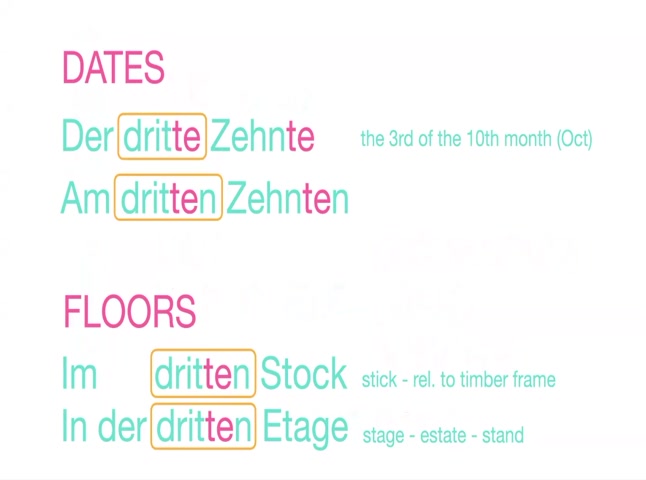
But I like , I like this nuance and you would use it mainly for two things , especially in a one , a two later levels also like for dates .
Yeah , you in a one exams , you have to talk about dates a lot or you have to at least understand the dates and make appointments .
And this is a little bit of an advanced example , but I have a whole master class on my youtube channel uh about dates and I recommend you take a look at it and I also possibly repeat the original numbers there .
That's pretty lovely in Germany , you could say the third 10th .
Yeah .
So which simply means the third of October because October is the 10th month , at least in German , there's other countries where that's not the case .
And the third is the third day of the 10th month .
And if you say let's meet on the third of October , yeah .

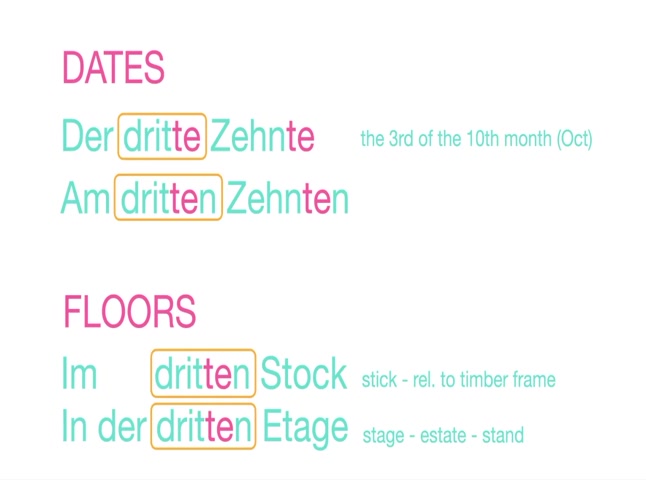
And so that will be the um written sent and you see that now kind of functions as an adjective and gets an ending as any other adjective would and as well , even though it's capitalized .
So these are beautiful things to explore at one point , but not in this master class floors seem to be very important .
People always like to ask , hey , what floor are you living on ?
Or if the Amazon deliver person comes And hey , what floor are you on ?
They would ask you in stock .
Are you , uh , in it ?
So , whether you stock or it for , uh , how do you call it , um , floor of the house .
Uh , that depends a little bit on where you are living or where you're coming from .
Um , I would preferably say stock .
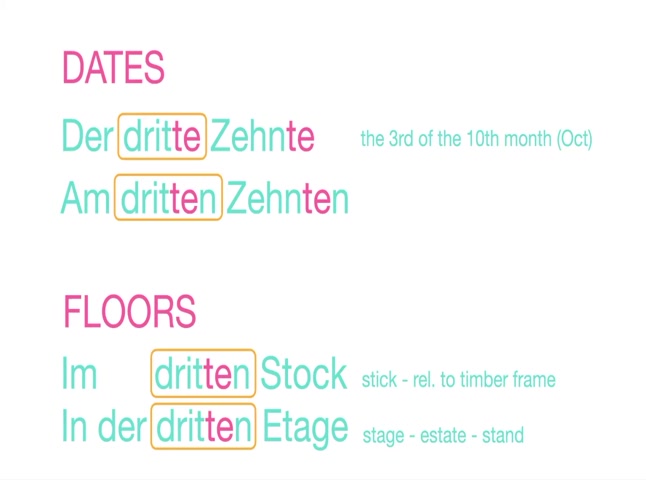
I come from northern Germany or the southern part of northern Germany to make it more complicated .
And uh therefore I would use stock and that's related to how people built houses in the past .
The ones , the nice ones with the which means timber frame and it is a little bit more like French .
Yeah , you can also use it if you are closer to that language and it comes from stage or it's related to stage and a state it has to do with standing .
So basically the it that you're living in ITAA is where you are staying , where you are standing around and waiting for your delivery .
And you see the grammar also needs to be adopted and they have different genders .
Stroke is the and is the , so that is what you really need the ordinary numbers for .
And as I said , the dates they require a whole master class on their own .
Um because there's quite some complexity and beauty in it .
Are you looking for a way to reach a wider audience and get more views on your videos?
Our innovative video to text transcribing service can help you do just that.
We provide accurate transcriptions of your videos along with visual content that will help you attract new viewers and keep them engaged. Plus, our data analytics and ad campaign tools can help you monetize your content and maximize your revenue.
Let's partner up and take your video content to the next level!
Contact us today to learn more.